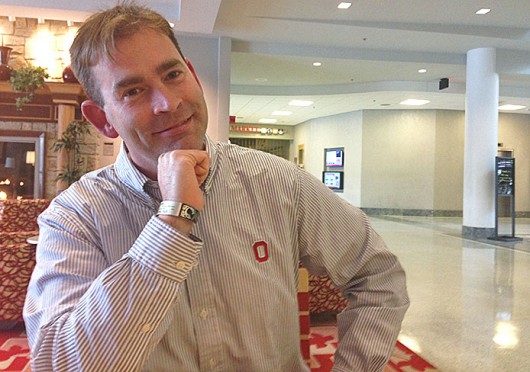
Bob Gribben, a director of service operations in the OCIO, poses for a photo Jan. 2. Gribben’s name is tied to the emails reminding students and faculty to change their passwords every 90 days.
Credit: Kristen Mitchell / Editor-in-chief
Students probably wouldn’t recognize Bob Gribben around campus — but many know his name.
What they think of him, though, he described as “hatred.”
A director of service operations in the Office of the Chief Information Officer, Gribben’s name is tied to the emails reminding students and faculty to change their passwords every 90 days.
While the 90 day turnover is considered an industry best practice, Gribben said, that doesn’t stop him from getting negative feedback.
“Faculty members are the ones that really email me and tell me, ‘Hey listen, your policy is a disaster, how could you make us reset our password, all you’re doing is creating an environment that causes us to be insecure,’” Gribben said. “They would really write up this nice, long dissertation, and I don’t have any control over it.”
The 90-day policy was put in place about three years ago, and Gribben’s name was put on the reminder emails to give it a personal touch.
“When they said, ‘Let’s make these letters that go out personal, let’s put somebody’s name on it,’ you know, it’s kind of like looking around the room, who wants to volunteer, and I remember my boss just kind of pointing right over at me, and I was like ‘Fine, put mine, I don’t care, whatever,’” he said.
The 1999 OSU graduate said at first he was overwhelmed by the negative response.
“I had a lot of people who were very, very, very verbally abusive, like angry,” he said. “They would find my office number … and I would get a call from someone who would just chew me a new one.”
Gribben said he quickly learned to brush off the attacks, but regularly checks Twitter to see what students are posting about him.
“I saw the massive amount of people that were like, you know, they pretty much said everything they could,” he said.
Gribben started responding to the messages and interacting with students.
“Let’s be honest, people live off the social media, and it’s an absolute blast,” he said. “People think that I’m like this 95-year-old man sitting at my computer … I’ve heard it all so far.”
Some students tweet about their emails from Gribben, others use the emails for inspiration.
Ashley Nussen, a third-year in psychology, said a password reminder email from Gribben is what inspired her to dress up as him for Halloween this year.
“I was lying in bed one night trying to sleep. It was the week of Halloween, I think, and I still didn’t have a costume and I got an email from Bob Gribben, like of course, reminding me to change my password … and then I came up with the idea to go as him,” Nussen said.
That weekend, Nussen said many were confused about what her costume was at first, but when people came up to her, she handed them a piece of paper telling them to change their password.
“People would be like, ‘Oh my God, I hate that guy,’” she said.
OCIO spokeswoman Beth Varcho said, “Other than the informal chatter on Twitter, we haven’t received any complaints” about the 90-day password policy.
“Obviously this practice is in place to keep university systems secure and confidential data safe,” Varcho said in an email. “As long as that is the case, we will continue with the 90 day password policy.”
When he’s not fielding questions regarding the password reset, Gribben oversees the Buckeye Bar in William Oxley Thompson Memorial Library and 8-HELP, an OCIO tech support line. However, he is still best known for the password emails, a legacy he didn’t expect when he volunteered his name to be used.
“It’s taken on its own life, it’s like its own role now,” Gribben said.


